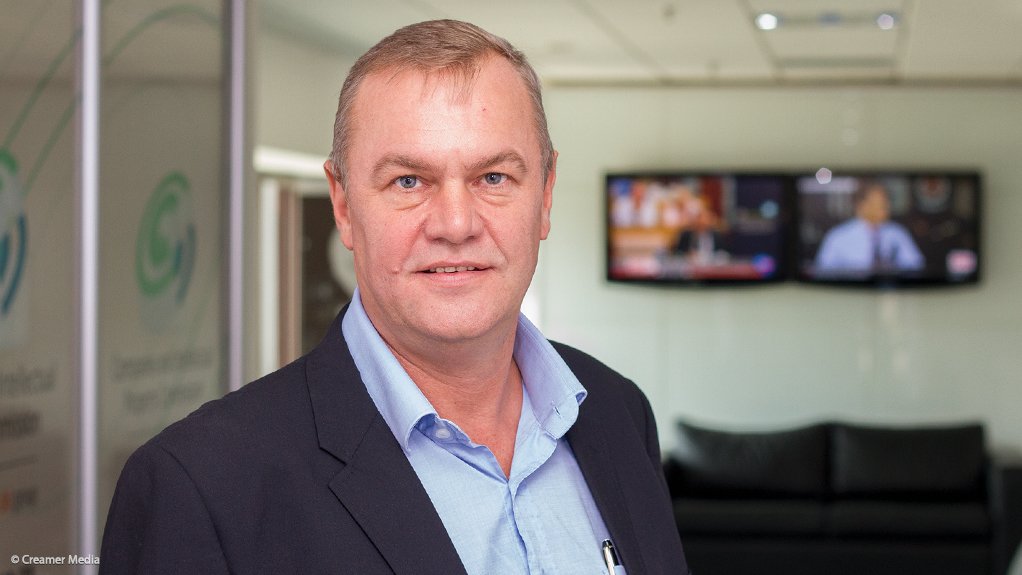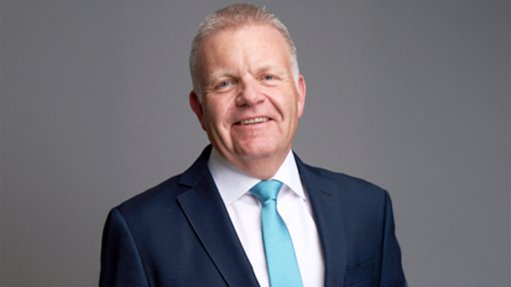ArcelorMittal SA CEO sees no way of avoiding longs closure, says wind down to start in Jan
ArcelorMittal South Africa (AMSA) CEO Kobus Verster believes there is no immediate prospect of addressing the structural issues undermining the financial viability of the group’s long-products business and tells Engineering News that the operations will begin ramping down during January, when they are scheduled to stop receiving steelmaking materials, such as iron-ore.
Verster provided this bleak assessment in an interview following the JSE-listed company’s announcement that it would be initiating consultations with unions and customers on the closure of its operations in Newcastle and Vereeniging, as well as ArcelorMittal Rail and Structural, which relies on intermediate products currently produced at Newcastle.
Although the closure of certain parts of the long-products business has been mooted previously, including in 2019 and 2021, the announcement of the proposed wind down still came as a shock, even though the group swung from a R3-billion profit in the first half of 2022 to a R448-million loss during the same period this year.
The loss was attributed largely to electricity load curtailment, implemented at energy-intensive firms at high stages of loadshedding, which had again been escalated to between Stage 4 and 6 when ArcelorMittal South Africa made its wind-down announcement.
It also came amid increased strain between business and government, more generally. Automotive group Volkswagen issued a warning about the company’s South African operations, citing loadshedding and logistics problems as key concerns, while platinum producers have indicated that job cuts are inevitable.
Meanwhile, Minister in the Presidency Khumbudzo Ntshavheni, who was widely condemned for suggesting that the private sector was engineering the collapse of the government when commenting on a rand manipulation-related settlement, appeared to double down in an opinion piece penned for the Business Day.
Verster spoke to Engineering News after having held in-person meetings with employees at the Newcastle mill, in KwaZulu-Natal, who make up about 2 600 of the 3 500 direct employees and contractors likely to be affected by the closures.
He reported that contact had also been made with the leadership of the company’s two recognised unions, being the National Union of Metalworkers and Solidarity, and indicated that formal negotiations were likely to start either later this week or early next week, with Section 189 retrenchment notices expected within days.
In a statement, Solidarity questioned the timing of what it described as a “drastic” move by the company and lamented the fact that 3 500 employees and their families faced an uncertain Christmas season.
It also argued that some of the reasons given for the proposed wind down, including loadshedding by Eskom and Transnet’s high costs and unreliability were “nothing new" and suggested that consultations should have been initiated ahead of any announcement.
However, Verster argued that, while high electricity and logistics costs and the unreliability of both utilities were aggravating factors, the competitiveness of the long-products business had been eroded by weak demand and a structural over-supply.
It had been further amplified by what he described as an artificial competitive advantage provided to electric-arc furnaces (EAFs) because of government’s prevailing scrap policy.
The company highlighted the preferential pricing system for scrap in its official statement on the wind down, arguing the policy, together with a 20% export duty and the recent scrap export ban, had made it impossible for an integrated iron-ore-based producer such as Newcastle to be price competitive.
While AMSA manufactured some value-added long products, the bulk of its 900 000 t/y longs production was low-margin material that was currently uncompetitive in a market where demand stood at about 1.8-million tons against Verster’s estimate of there being yearly production capacity of four-million tons.
The flat-products business was less vulnerable largely because AMSA was the last remaining domestic supplier and because it produced more value-added products required by the domestic market.
The company’s production had, thus, increasingly been weighted towards the flat business in recent years, and currently produced about 2.2-million tons yearly, more than double the volume of long products.
The lack of competitiveness of the long-products unit had been compounded, however, by ongoing electricity curtailment by Eskom and, increasingly, by the unreliable rail service.
Transnet Freight Rail (TFR) had been unable to guarantee the delivery of raw materials, particularly to Newcastle, which is located a long distance away from the iron-ore mines in the Northern Cape.
While the group was supplementing rail with more expensive road transport, Verster said a failure of TFR to deliver anticipated iron-ore volumes two months ago forced the shutdown of a Newcastle furnace, which carried a direct cost of R150-million to the business.
Once Newcastle was shut, it would seek to ensure that some of the locomotives that serviced the mill previously would be used to service Vanderbijlpark, where rail was currently only meeting 65% of volumes, even though the mill was never designed to receive materials by road.
Vanderbijlpark consumed about 4.5-million tons of iron-ore yearly, while Newcastle consumed about 1.6-million tons.
Verster said that attention would be paid in the coming month to the safe shutdown of the assets, with lessons to be drawn from its 2020 mothballing of the Saldanha Steel facility in the Western Cape.
Communication lines had been opened with government, but he expressed pessimism about the ability of government to intervene in a way that could address the structural problems present in the market.
He refused to be drawn on the retrenchment and restructuring costs, or on the potential revenue impact on what is currently a R30-billion business.
However, Verster insisted that it would emerge as a smaller, more sustainable business, located primarily at Vanderbijlpark and where capital investment would increasingly be directed towards product development and future growth.
Article Enquiry
Email Article
Save Article
Feedback
To advertise email advertising@creamermedia.co.za or click here
Press Office
Announcements
What's On
Subscribe to improve your user experience...
Option 1 (equivalent of R125 a month):
Receive a weekly copy of Creamer Media's Engineering News & Mining Weekly magazine
(print copy for those in South Africa and e-magazine for those outside of South Africa)
Receive daily email newsletters
Access to full search results
Access archive of magazine back copies
Access to Projects in Progress
Access to ONE Research Report of your choice in PDF format
Option 2 (equivalent of R375 a month):
All benefits from Option 1
PLUS
Access to Creamer Media's Research Channel Africa for ALL Research Reports, in PDF format, on various industrial and mining sectors
including Electricity; Water; Energy Transition; Hydrogen; Roads, Rail and Ports; Coal; Gold; Platinum; Battery Metals; etc.
Already a subscriber?
Forgotten your password?
Receive weekly copy of Creamer Media's Engineering News & Mining Weekly magazine (print copy for those in South Africa and e-magazine for those outside of South Africa)
➕
Recieve daily email newsletters
➕
Access to full search results
➕
Access archive of magazine back copies
➕
Access to Projects in Progress
➕
Access to ONE Research Report of your choice in PDF format
RESEARCH CHANNEL AFRICA
R4500 (equivalent of R375 a month)
SUBSCRIBEAll benefits from Option 1
➕
Access to Creamer Media's Research Channel Africa for ALL Research Reports on various industrial and mining sectors, in PDF format, including on:
Electricity
➕
Water
➕
Energy Transition
➕
Hydrogen
➕
Roads, Rail and Ports
➕
Coal
➕
Gold
➕
Platinum
➕
Battery Metals
➕
etc.
Receive all benefits from Option 1 or Option 2 delivered to numerous people at your company
➕
Multiple User names and Passwords for simultaneous log-ins
➕
Intranet integration access to all in your organisation




















